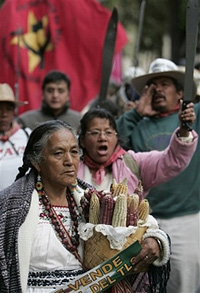
|
 |
 |
 News Around the Republic of Mexico | January 2008 News Around the Republic of Mexico | January 2008  
Calderon Defends NAFTA Despite Protests
 Mica Rosenberg - Reuters Mica Rosenberg - Reuters
go to original


| | Mexican farmers protest the end of import protections for their country's corn and bean crops in Mexico City, Wednesday, Jan. 2, 2008. Corn, beans, sugar and milk were granted special 15-year import protections when the North American Free Trade Agreement, or NAFTA, was negotiated in 1993. (AP/Eduardo Verdugo) | | |
Mexico City - Mexican President Felipe Calderon defended a regional trade deal on Monday even as farm groups were mounting protests against an expected flood of cheap U.S. agricultural goods since all tariffs ended January 1.

At the start of the year Mexico lifted 14 years of protection for corn, beans, milk and sugar under the North American Free Trade Agreement (NAFTA) that took effect in 1994. The regional trade pact groups Mexico, the United States and Canada.

The move will allow the United States, the world's biggest corn producer, to sell more to the country that claims to have discovered the grain.

Some Mexican farmers say competing against highly subsidized U.S. goods could put thousands out of work on top of about 2 million Mexican farm jobs lost over the last decade.

But Calderon said increased trade integration with the United States and Canada was the only way to strengthen Mexico's economy.

"The free trade agreement, negotiated almost 15 years ago, has its pros and cons, but overall it has benefited the country," Calderon said in a speech.

He said that instead of loosing jobs, Mexican farmers could benefit from the trade deal.

"There are more, and better-paid, jobs than in 1994 in the sectors linked to the treaty," said Calderon.

"Countries in the region now buy almost five times as many Mexican farm products than in 1994," said Calderon. "We are the second largest providers of agricultural goods to the United States and the third largest to Canada," he said.

But farmers complain they have not received enough support from the government since NAFTA was signed and say they will continue protest marches this month against the trade opening.

Congress last week urged the president to consider revising the treaty to protect farmers.

(Editing by David Gregorio) | 
 | |
 |



